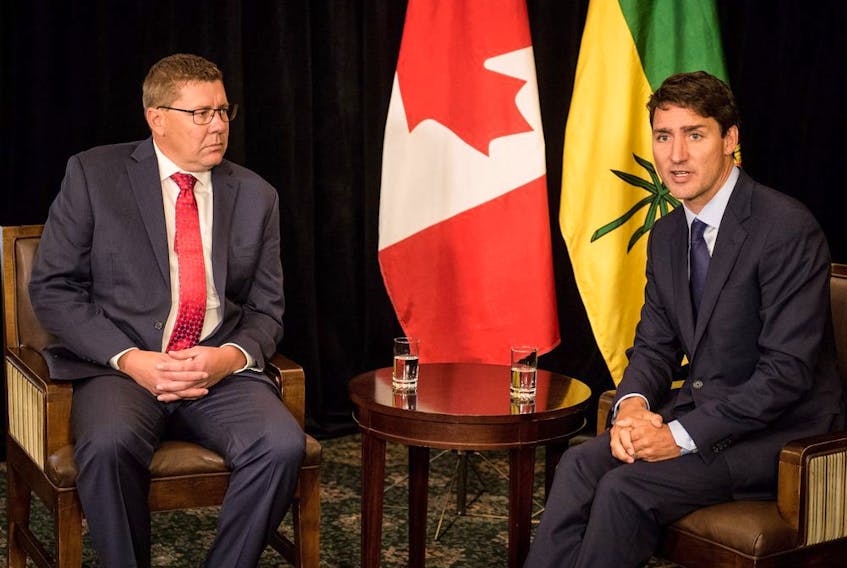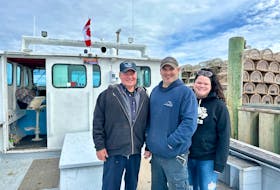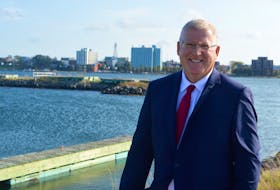TORONTO, Ont. — Atlantic Canadian premiers are expected to play peacemaker Monday as the Council of the Federation gathers in Toronto with hopes of finding common ground ahead of the Dec. 5 return of Parliament.
It’s the first meeting of all Canada’s premiers since the results of the October election painted a picture of a fractured country, raising concerns about western alienation and national unity. The meeting, which is not one of the council’s regularly scheduled gatherings, was announced following a conference call with the premiers in early November. Saskatchewan Premier Scott Moe is the current chair of the council and hosted the last Council of the Federation meeting in Saskatoon in July.
University of P.E.I. political science professor Don Desserud said the Council of the Federation can have a lot of political clout depending on what’s going on in the country.
“We have a situation right now where this council could be very influential and the reasons are, number one, that the government in Ottawa is in a minority situation so they feel vulnerable, and number two, this whole question of Western alienation,” Desserud said.
Cape Breton University political science professor Tom Urbaniak said due to the brevity of the meeting — it’s supposed to wrap up before 2 p.m. — he expects the council to get right to work on finding some items of agreement.
“I think the point in scheduling this meeting, a short meeting before Parliament resumes, is to absolutely influence the tone of federal policy for the upcoming session,” Urbaniak told SaltWire.
More than a congenial get-together, Urbaniak said the premiers believe they will be able to issue some sort of a statement by Monday afternoon listing some shared priorities — and they expect Ottawa to take note.
“I think the point in scheduling this meeting, a short meeting before parliament resumes, is to absolutely influence the tone of federal policy for the upcoming session." — Tom Urbaniak, Cape Breton University political science professor
“Scott Moe as chair is taking as his cue a statement apparently made to him by Justin Trudeau (that) if there are areas of consensus among the premiers that will be very influential with the setting of federal policy,” Urbaniak said.
Based on public comments from Moe and others, there are expected to be three key agenda items brought forward: fiscal stabilization for oil-producing provinces like Alberta that have faced financial struggles in recent years; pipelines and the federal government's environmental impact assessment legislation Bill C-69; and the role of the provinces in shaping climate change policy, especially surrounding carbon pricing which a number of the premiers oppose.

Atlantic premiers to play negotiators
With the meeting expected to focus primarily on areas of importance to the West, Urbaniak said he predicts Atlantic premiers will play a moderate, and moderating, role in the discussion.
“I think the Atlantic premiers will ... not necessarily take an anti-federal role in this meeting,” he said.
“It’s in the interest of the Atlantic premiers to maintain proactive roles for the federal government. Because our region has been economically disadvantaged, we are looking for opportunities for federal investment in infrastructure and national programs if there's significant federal funding attached, like pharmacare.”
Desserud shared that assessment.
“The trouble with these councils is that they don’t vote, it’s not like you have four votes for Atlantic Canada, they find a consensus, and when they try and find a consensus it's not based on numbers, it’s based on your influence and power,” he said. “Atlantic Canada doesn't get to put the brakes on stuff, it’s simply because we don’t have the size and therefore we don’t have the clout within that organization, but they can be very useful as brokers, they can be very useful in finding compromises.”
For the two Progressive Conservative premiers, Dennis King for P.E.I. and Blaine Higgs for New Brunswick, Desserud said it will be about compromise and allyship with the conservative-leaning leadership of the Western provinces.
That co-operation has already started. At a joint press conference in Toronto on Sunday, at the same hotel where Monday’s meetings are set to take place, Higgs, Moe and Ontario Premier Doug Ford — all opponents of federally-mandated carbon pricing — announced plans to work together on the development of small nuclear reactor technology as part of their own efforts to reduce greenhouse gas emissions.
“Atlantic Canada doesn't get to put the brakes on stuff, it’s simply because we don’t have the size and therefore we don’t have the clout within that organization, but they can be very useful as brokers, they can be very useful in finding compromises.” — Don Desserud, UPEI political science professor
For Nova Scotia Premier Stephen McNeil and Newfoundland and Labrador Premier Dwight Ball, two of the three remaining Liberal premiers in the country along with Yukon Premier Sandy Sliver, their approach will likely be more decidedly pro-federal.
“Newfoundland is in an interesting situation because they see themselves as an oil resource economy … I think will play a leading role in negotiating and in helping people work together,” Desserud said.
Speaking with reporters following a meeting with Trudeau in Ottawa last week, Ball talked about the importance of the provinces working together rather than picking fights with one another on issues like equalization. Instead, he said, they should instead be looking for solutions to help struggling provinces through resource development as well as looking outside the equalization framework to more flexible programs like federal fiscal stabilization program.
The Council of Atlantic Premiers also met via a conference call last week to discuss shared priorities ahead of the Council of the Federation meetings. According to a joint press release, those priorities include federal-provincial relations, health care funding, pharmacare, labour and immigration, and natural resource development and clean energy.
Monday’s meeting will take place at the Hilton Toronto Airport Hotel and is expected to begin at about 8:30 a.m. and wrap up in the early afternoon. A closing press conference is scheduled for 2 p.m.
Twitter: @notandrea









